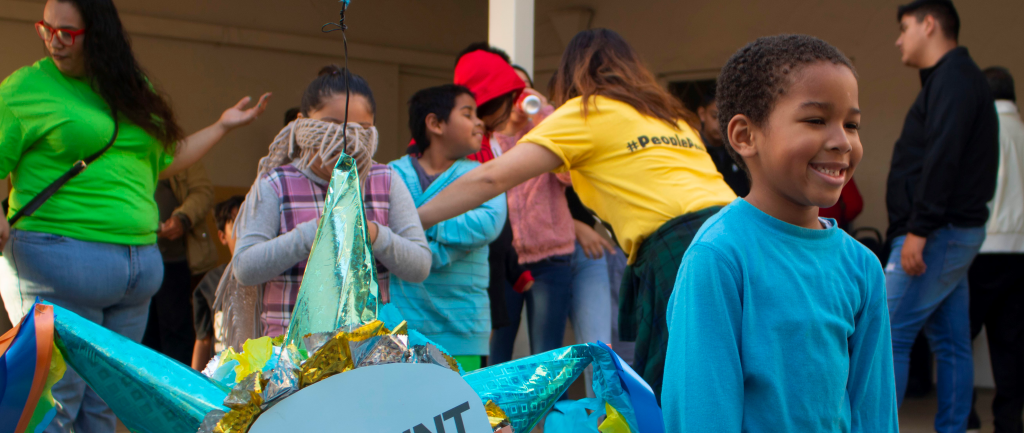Long Beach families are all smiles at a recent “Census Fiesta” outreach event hosted by a collaborative of community-based organizations, including Community Partners projects Long Beach Forward and Long Beach Immigrant Rights Coalition.
Community-based organizations (CBO’s) across Los Angeles County are playing key roles in preparing Angelenos for the 2020 Census, possibly one of the most crucial – and challenging – in California’s history. Among the 100 or so groups taking on this important work are at least 10 projects of Community Partners.
“The census is part of our organization’s DNA,” explained Tavae Samuelu, executive director of EPIC (Empowering Pacific Island Communities), one of those participating projects. “Many founders (of EPIC) started to participate in census meetings in 2009. They knew how important it was that our communities be counted.”
Under Samuelu’s leadership, EPIC is continuing that tradition by working at the local, state and national levels, in partnership with Asian Americans Advancing Justice, to assure that hard-to-count populations, like Pacific Islander communities, are informed and included in the census. Because the Census Bureau is not translating materials for Pacific Islander communities, one of EPIC’s roles is to translate materials into eight different languages, including basic fact sheets, information about how community-based organizations can get involved, and in-language PSAs.
Nearly half of Los Angeles County residents fall under the Census Bureau’s hard-to-count populations designation, an expansive list that includes children 0-5, underrepresented racial and ethnic groups, non-English speakers, low-income persons, people experiencing homelessness, undocumented immigrants, LGBTQIA+, and persons who do not live in traditional housing. We’re actually home to more of these populations than anywhere else in the country.
Reaching these individuals, many whose identities intersect across multiple designations, requires deep understanding, connections, cultural competence, and the ability to elicit trust. Which is why there is so much focus and funding right now on supporting the work of community- based organizations.
One of the biggest regional funders is the California Community Foundation, appointed by the State of California as the region’s Administrative Community-Based Organization (ACBO). To date, their investment in the census efforts in the region total $12.7 million, which has been directed to 100 community-based partners from every corner of L.A. County. This network has come together as the We Count LA campaign, with an array of partners that includes Community Partners projects such as Latino Equality Alliance (reaching LGBTQIA+ communities), Los Angeles Black Worker Center (targeting African Americans in South LA and Compton) and California Native Vote Project (reaching Native American and Tribal communities in Inglewood and Hawthorne. (See the end for a complete list of projects.)
“Los Angeles has been undercounted in the past and we’re at risk now, so community-based organizations are our best bet in crossing barriers and developing innovations that reach our hard-to-count populations,” explained James Suazo, associate director of Long Beach Forward, the Community Partners project serving as a regional co-convenor with the Advancement Project in the Long Beach area.
Suazo and his staff have been helping area CBO’s to develop their outreach plans, understand data tracking, and strategize about how to overcome the various challenges posed by the 2020 Census.
“For one, this is the first digital census, and that can be a hurdle to lower-income people who might not have access to the internet in their homes,” he explained. In response, many participating groups, including his, are making their offices available as Community Assistance Centers where individuals can come in, use computers and get help completing their census.
Other major challenges shared by many hard-to-count populations noted by both Suazo and Samuelu relate to a mistrust of government, fear of anti-immigrant attitudes, a general lack of understanding about the census itself and how participation can help marginalized communities.
A hyper-local approach in outreach and messaging is an important way for CBO’s, who best know how to communicate with their bases, to address these and other challenges.
“CBO’s are the trusted messengers who can reach and mobilize their communities,” said Samuelu. “And they have the social and political capital to do so.”
Community Partners projects taking on various aspects of census work include:
Active SGV – providing outreach in English, Spanish, Mandarin and Vietnamese in the San Gabriel Valley
California Native Vote Project – focusing on Native American and Tribal communities in Inglewood and Hawthorne
*El Monte Promise Foundation – Reaching out to Asian American Pacific Islander (AAPI), children 0-8, homeless families, people in non-conventional housing, immigrants and refugees, and Latinos in the San Gabriel Valley
Empowering Pacific Islander Communities – county-wide focus on AAPI, immigrant and refugees, LGBTQIA+, Pacific Islanders, seniors/older adults
*Latino Equality Alliance – targeting children 0-8 and Latinos, LGBTQIA+
*Long Beach Forward – In addition to community-based organizations, also reaching Cambodian, Latino, and Filipino communities in Long Beach/San Pedro
Long Beach Immigrant Rights Coalition – Connecting with immigrant communities in Long Beach
*Los Angeles Black Worker Center – Focusing on African Americans in South LA/Compton
API Equality LA – Outreach to Pacific Islander and LGBTQIA+ populations
Mayor’s Fund for Education – Census work is targeting children 0-5 in Long Beach, with outreach to early education centers to encourage families to both participate in the census and to be sure to include their young children
*indicates project is serving as a Community Assistance Center





